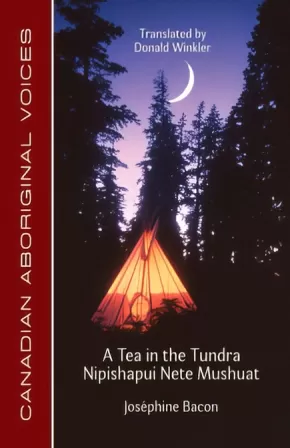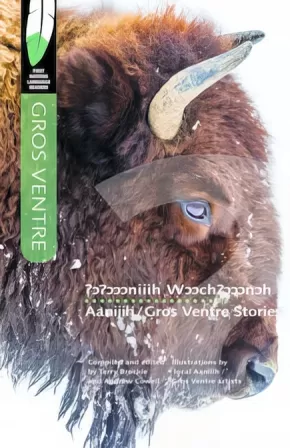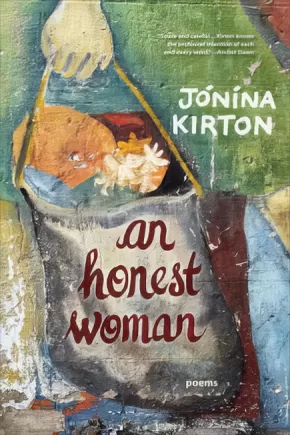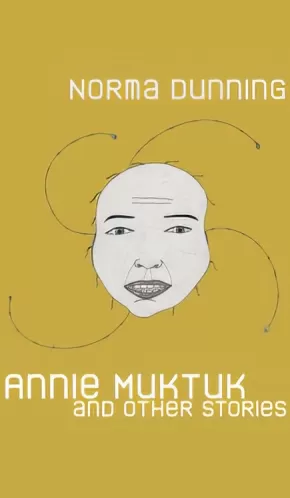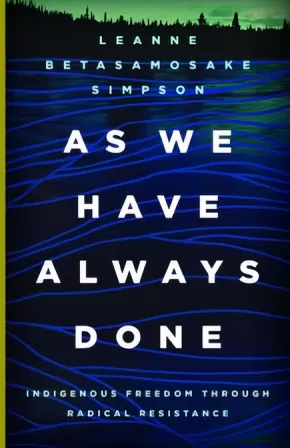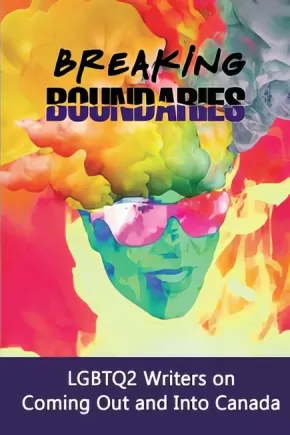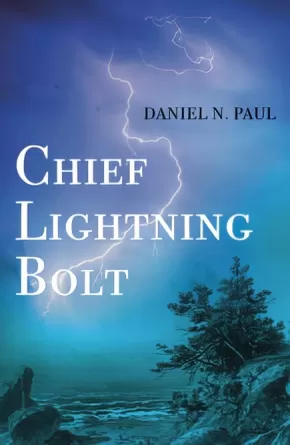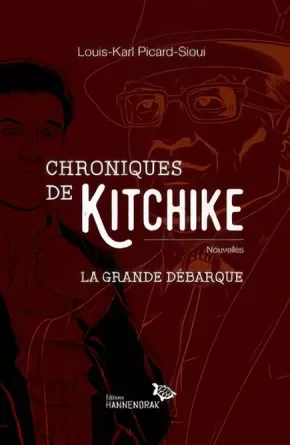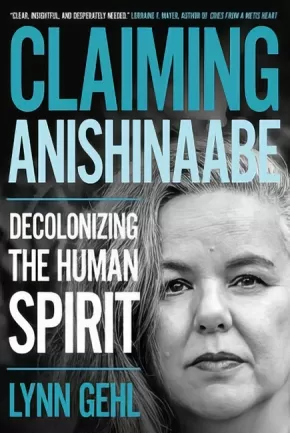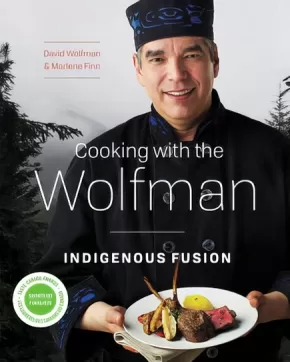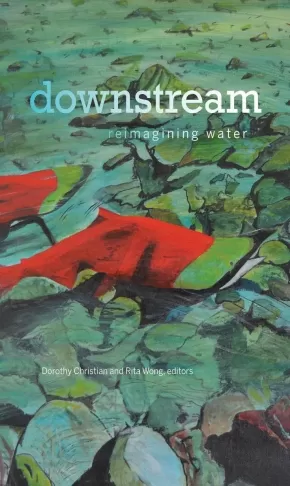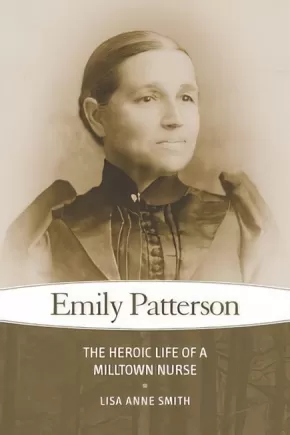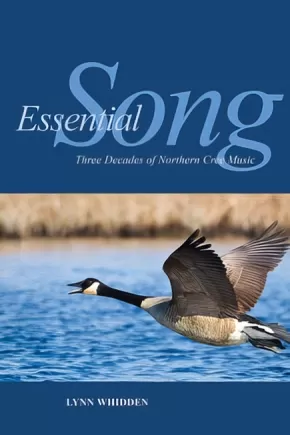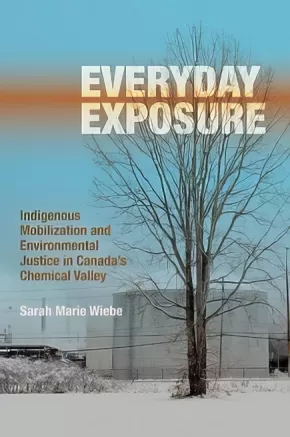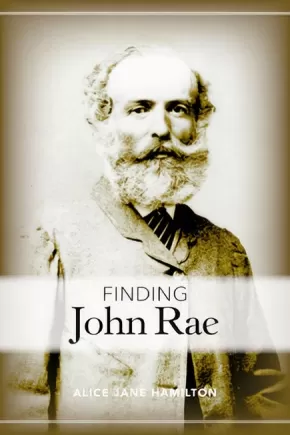Adult Book
Synopsis:
In this bilingual English-Innu poetry collection, Joséphine Bacon challenges our traditional notions of culture and perception, landscape and wilderness, the limits of experience, and the nature of human being. With a surreal blend of emotions and memories, A Tea in the Tundra / Nipishapui Nete Mushuat portrays a complex and ever-shifting landscape of possibilities. The author passionately reveals a finely wrought sensibility, which elevates the subtle scenery of life's everyday events.
Educator & Series Information
This book is part of the Canadian Aboriginal Voices series.
Additional Information
96 pages | 5.50" x 8.50" | Translated by Donald Winkler
Synopsis:
The first-ever collection of Anniiih/Gros Ventre narratives to be published in the Aaniiih/Gros Ventre language, this book contains traditional trickster tales and war stories. Some of these stories were collected by Alfred Kroeber in 1901, while others are contemporary, oral stories, told in the past few years.
As with the previous titles in the First Nations Language Readers series, Aaniiih/Gros Ventre Stories comes with a complete glossary and provides some grammar usage. Delightfully illustrated, each story is accompanied by an introduction to guide the reader through the material.
The Aaniiih/Gros Ventre people lived in the Saskatchewan area in the 1700s, before being driven south during the 1800s to the Milk River area in Montana, along the USA/Canada border.
Educator & Series Information
This book is published in the Aaniiih/Gros Ventre language. An English glossary is provided at the back of the book.
The Canadian Indigenous Books for Schools list recommends this resource for Grades 10-12 for these subjects: English Language Arts, Indigenous Language Studies, Language Studies.
Aaniiih/Gros Ventre Stories is part of the First Nations Language Readers series. With a mix of traditional and new stories, each First Nations Language Reader introduces an Indigenous language and demonstrates how each language is used today. The University of Regina Press’s long-term goal is to publish all 60+ Indigenous languages of Canada.
Additional Information
120 pages | 5.50" x 8.50" | Compiled and Edited by Terry Brockie and Andrew Cowell
Synopsis:
An Honest Woman by Jonina Kirton confronts us with beauty and ugliness in the wholesome riot that is sex, love, and marriage. From the perspective of a mixed-race woman, Kirton engages with Simone de Beauvoir and Donald Trump to unravel the norms of femininity and sexuality that continue to adhere today.
Kirton recalls her own upbringing, during which she was told to find a good husband who would “make an honest woman” out of her. Exploring the lives of many women, including her mother, her contemporaries, and well-known sex-crime stories such as the case of Elisabeth Fritzl, Kirton mines the personal to loosen the grip of patriarchal and colonial impositions.
An Honest Woman explores the many ways the female body is shaped by questions that have been too political to ask: What happens when a woman decides to take her sexuality into her own hands, dismissing cultural norms and the expectations of her parents? How is a young woman’s sexuality influenced when she is perceived as an “exotic” other? Can a woman reconnect with her Indigenous community by choosing Indigenous lovers?
Daring and tender in their honesty and wisdom, these poems challenge the perception of women’s bodies as glamorous and marketable commodities and imagine an embodied female experience that accommodates the role of creativity and a nurturing relationship with the land.
Reviews
“Jonina Kirton is courageously honest about her life experiences as a female of Indigenous and immigrant ancestry. Many poems resonate deeply, as we identify with her personal quest to figure out who she is, and the unacceptable things done to her. Her raw honesty is unsettling and uncomfortable, because it can be our truth too. Her poems depict devaluation and dehumanization, grieving, lessons learned. Her poems offer important insights as to why there are thousands of missing and murdered Indigenous women.” — Senator Lillian E. Dyck
“When writing from the voice of between, writer and reader have no place to hide. Assumptions and camouflage fall away. Murdered, missing, and violated women and girl voices have been silenced. The story lethally repeats. Kirton picks over how she was raised familially and culturally like a crime scene. Too, she affirms, ‘I have been here forever and I will rise again and again.’ Tough, eloquent, revelatory, these poems are the very ones we are desperately in need of.” — Betsy Warland, author of Oscar of Between: A Memoir of Identity and Ideas
“I’m sure people have been looking at me strangely every time I gasp, but I can’t glance away from the page for even a second to notice. Some of the poems end sharply, with a punch; some deliberately leave me searching for the next line; others show the repetition of heartbreaking cycles of violence and oppression, but offer a portrayal of resilience, too.” — All Lit Up!
Educator Information
This book would be useful for Women's Studies, Creative Writing, English Language Arts, Poetry, and English courses. Recommended for grades 11-12 and university-college students.
Please be advised, this book contains explicit sexual references and references to sexual and physical abuse.
Additional Information
104 pages | 6.00" x 9.00"
Synopsis:
I woke up with Moses Henry’s boot holding open my jaw and my right eye was looking into his gun barrel. I heard the slow words, “Take. It. Back.” I know one thing about Moses Henry; he means business when he means business. I took it back and for the last eight months I have not uttered Annie Mukluk’s name.
In strolls Annie Mukluk in all her mukiness glory. Tonight she has gone traditional. Her long black hair is wrapped in intu’dlit braids. Only my mom still does that. She’s got mukluks, real mukluks on and she’s wearing the old-style caribou parka. It must be something her grandma gave her. No one makes that anymore. She’s got the faint black eyeliner showing off those brown eyes and to top off her face she’s put pretend face tattooing on. We all know it’ll wash out tomorrow. — from "Annie Muktuk"
When Sedna feels the urge, she reaches out from the Land of the Dead to where Kakoot waits in hospital to depart from the Land of the Living. What ensues is a struggle for life and death and identity. In “Kakoot” and throughout this audacious collection of short stories, Norma Dunning makes the interplay between contemporary realities and experiences and Inuit cosmology seem deceptively easy. The stories are raucous and funny and resonate with raw honesty. Each eye-opening narrative twist in Annie Muktuk and Other Stories challenges readers’ perceptions of who Inuit people are.
Awards
- 2017-2018 Danuta Gleed Literary Award Winner
- 2018 INDIEFAB Book of the Year (Short Stories)
- 2018 Howard O'Hagan Award for Short Story
Reviews
"Dunning’s stories, nuanced and deeply felt, reach deep into the heart of what it means to be Inuit, into the sacred place where the songs of the north are still sung, visions are still seen, and the spirits still speak. From this place, it is possible to laugh at those who come to destroy. From this place, dignity is maintained and the connection to the turning of the seasons is unbroken. Together with grief for what has been lost, there is power and light in these stories." — Kristine Morris, Foreword Magazine, June 2017
"When I read the article, 'What inspired her was getting mad,' about the story behind Norma Dunning’s debut collection, Annie Mukluk and Other Stories, I was not surprised. Acts of justice and revenge factor throughout the book, propelling the stories so terrifically. Dunning wrote her stories in response to ethnographic representations of Inuit people that neglected to show them as actual people, and the result is a book that’s really extraordinary. Because her people are so real, people who laugh, and joke, and drink, and have sex (and they have a lot of sex)." — Kerry Clare, Pickle Me This, August 2017
"Although [Dunning] deals with serious contemporary realities for Inuit people, she manages to work in moments of humour that flesh out her characters, making them fully realized and complex.”— Matthew Stepanic, Where.ca, September 2017
"A successful short story takes us to unfamiliar places, and the 16 stories in this collection certainly fill that bill. It’s a journey deep into Inuit life, with tales of Inuk of all shapes, genders and ages. The title story is at turns funny, violent and cunning: Jimmy tries to convince best friend Moses to stay away from the glorious Annie Muktuk, an arnaluk (naughty woman, according to the glossary) who will cause him grief." — Sarah Murdoch, Toronto Star, November 2017
"This whole collection is fantastic, but the story with the bad trip is 'Husky', inspired by the life of trapper and HBC Factor "Husky" Harris whose visit to Winnipeg with his three Inuit wives, Tetuk, Alaq and Keenaq, is written about in history books. In the story, naturally, the group and their children make an impression at their hotel, and the racism of hotel staff leads to a fight that lands Husky in the hospital. The violence doesn't end there and the women are further victimized—but then they enact the most beautiful justice." — Kerry Clare, 49th Shelf, August 2017
"Inuk writer Norma Dunning’s debut collection passed under the radar of the big awards despite being the year’s best short fiction collection. The stories infuse Inuit myth with reality, explore the effects of colonialism, and delve into settler-writer portrayals of Inuit, all told with heart and humour that is infectious." — Michael Melgaard, National Post, December 2017
Additional Information
198 pages | 5.25" x 9.00"
Synopsis:
Across North America, Indigenous acts of resistance have in recent years opposed the removal of federal protections for forests and waterways in Indigenous lands, halted the expansion of tar sands extraction and the pipeline construction at Standing Rock, and demanded justice for murdered and missing Indigenous women. In As We Have Always Done, Leanne Betasamosake Simpson locates Indigenous political resurgence as a practice rooted in uniquely Indigenous theorizing, writing, organizing, and thinking.
Indigenous resistance is a radical rejection of contemporary colonialism focused around the refusal of the dispossession of both Indigenous bodies and land. Simpson makes clear that its goal can no longer be cultural resurgence as a mechanism for inclusion in a multicultural mosaic. Instead, she calls for unapologetic, place-based Indigenous alternatives to the destructive logics of the settler colonial state, including heteropatriarchy, white supremacy, and capitalist exploitation.
Awards
- Native American and Indigenous Studies Association's Best Subsequent Book 2017
Reviews
"This is an astonishing work of Indigenous intellectualism and activism—by far the most provocative, defiant, visionary, and generous of Leanne Betasamosake Simpson's impressive corpus to date."—Daniel Heath Justice (Cherokee Nation), University of British Columbia
"I have learned more about this battered world from reading Leanne Betasamosake Simpson than from almost any writer alive today. A dazzlingly original thinker and an irresistible stylist, Simpson has gifted us with a field guide not to mere political resistance but to deep and holistic transformation. It arrives at the perfect time."—Naomi Klein, author of The Shock Doctrine and This Changes Everything
"A remarkable achievement that illuminates what is possible when we engage in the revolutionary act of indigenous self-love, As We Have Always Done asks the simple question, ‘What if no one sided with colonialism?’ The many possible answers to that question are reflected in Leanne Betasamosake Simpson’s beautifully written book in which she kindly challenges indigenous people to reclaim their lives and bodies from the settler colonial state."—Sarah Deer (Muscogee [Creek] Nation), author of The Beginning and End of Rape
"Incisive. Unmitigated. Inspiring. Simpson gives no quarter to colonialism. No quarter to a nasty Western narrative. She provides a pure, Indigenous lens—a lens that the white man tried to kill and bury. This book is a reminder that they failed in that rotten endeavor. It belongs on every Canadian bookshelf. On every American coffee table. Simpson's words are an affirmation of Indigenous resilience and resolve."—Simon Moya-Smith (Lakota and Chicano), culture editor at Indian Country Media Network
"Leanne Betasamosake Simpson confronts colonialism from the perspective of indigenous nationhood, but goes beyond arguing for changes in politics, writing in a way that enacts changes in our thinking about politics."—Indian Country Today
"While her intended audience is other Indigenous peoples, I think non-Indigenous Canadians will find it inspiring as they take up her challenge of decolonization."—Watershed Sentinel
"As We Have Always Done is an in-depth look into indigenous resistance and what is possible when that resistance embraces indigenous culture. It gives us a glimmer of hope. Hope that there is another way to live. That we can forge relationships, be with each other, and live for much more than what neo-liberal capitalism tells us life is about."—The Collective
"This book will not only offer the Indigenous community much courage, but it will also open the eyes of many non-indigenous people. We have here not just a description of a state of affairs, but also a practical guide. A very important, successful publication."—Amerindian Research
"The book is essential for anyone studying any aspect of Indigenous decolonization, politics, law, and settler colonialism, and signals a vital shift away from current neoliberal discussions and policies of indigenization and reconciliation in order to rebuild and recover indigenous nationhoods."—Transmotion
Additional Information
320 pages | 5.50" x 8.50" | Paperback
Synopsis:
An anthology of stories and poetry written by Canadian LGBTQ2 authors who are immigrants, refugees, or Canada-born.
“What does it mean to be LGBTQ2 in Canada? The only possible answer to that question is one given in many voices. That is exactly what this book offers. There is struggle in these stories and poems, but there is also strength and resilience, compassion and determination. Woven together these voices leave me with a sense of hopefulness: a belief that the creativity and fierce commitment of our community will carry us forward as we work to create a Canada that lives up to the dream of freedom and safety it represents to so many people around the world.” — Robin Stevenson, author of Pride: Celebrating Diversity and Community
Review
The anthology pieces are diverse with authors who identify as Lesbian, Gay, Bisexual, Transgender and 2-Spirited. It also includes stunning artwork by LGBTQ artists and allies. — Rainbow Refugee Society
Authors & Artists
Authors in this anthology include Teryl Berg, Kyle Chen, Wendy Judith Cutler, Corrie Hope Furst, Kevin Henry, Anne Hofland, Chantal Hughes, Masaki Kidokoro, Dale Lee Kwong, Austin Lee, JL Lori, Eka Nasution (narrator), Adam Nixon, Rainer Oktovianus (narrator), Gail Marlene Schwartz, Caelan Sinclair, LS Stone, Sosania Tomlinson, E.T. Turner, and Hayley Zacks.
Artwork by Joni Danielson, Wokie Clark Fraser, Austin Lee, Trinity Lindenau, and Rainer Oktovianus.
Additional Information
146 pages | 6.00" x 9.00"
Edited by Lori Shwydky
This book contains memoirs, stories, poems, and artwork, which is why it appears in a variety of categories, such as both Fiction and Non-fiction, on our website.
Synopsis:
Here is a contemporary Mi’kmaq legend of the life of a great man, who becomes chief, the embodiment of Mi’kmaq values of humility, courage, honour, service and sacrifice of personal gain for the sake of others. He lived a long and storied life, hundreds of years ago, before the arrival of the European scouts and, later, their warships. He was a renowned warrior but, more so, a peacemaker. His people followed him to the point of devotion, yet he was uncannily modest, even embarrassed by his own achievements. He suffered great loss, yet his understanding of his place, his role in a great society, a greater natural world and an inestimable metaphysical world, guided him through his pain.
Mi’kmaq readers may recognize these time-honoured themes based on traditional tales passing values generation to generation. Others will gain a new appreciation for what was lost under colonialism and the attempted genocide of this vibrant, sophisticated and successful culture and society.
With We Were Not the Savages, Daniel Paul changed the way the world understood the history of Eastern Canada and the fully developed civilization that existed before the arrival of the European explorers and settlers, and the nature of the subsequent violent attack on that culture. With Chief Lightning Bolt, Paul shows us exactly what was lost, the beauty of the Mi’kma’ki that once existed, the culture that survived and is only now beginning to recover.
Reviews
“Being with Chief Lightning Bolt from his beginning to the end, is a great way to learn the history of our ancestors. A unique way of teaching about the past. Wela’lin.” — Theresa Muise, author of L’nu’k: The People
“It is incredibly entertaining while gently enlightening modern-day readers about the humane, balanced, honourable, trustworthy, civil and democratic nature of pre-contact Mi’kmaq society.” — Randolph Bowers, author of Sacred Teachings from the Medicine Lodge
Additional Information
288 pages | 6.00" x 9.00"
Synopsis:
Avec son premier recueil de nouvelles, Chroniques de Kitchike : la grande débarque, Louis-Karl Picard-Sioui nous propose une incursion au cœur d’une communauté autochtone haute en couleur où se côtoient traditions, rêves, déchéance et… corruption.
Dans une langue imagée, il nous plonge dans le quotidien de femmes et d’hommes ordinaires qui sont confrontés à des forces politiques, économiques et mythiques qui les dépassent. Avec un humour grinçant et un brin de fantastique, l’auteur dépeint les relations parfois tendues dans les communautés du sud du Québec, laissant apparaître en filigrane une radiographie de notre société multiculturelle. Les Chroniques de Kitchike nous transportent dans un univers singulier et désopilant, suave et mythique, où s’anime une galerie de personnages que nous ne sommes pas près d’oublier!
Additional Information
Short Stories
Synopsis:
Denied her Indigenous status, Lynn Gehl has been fighting her entire life to reclaim mino-pimadiziwin--the good life. Exploring Anishinaabeg philosophy and Anishinaabeg conceptions of truth, Gehl shows how she came to locate her spirit and decolonize her identity, thereby becoming, in her words, "fully human." Gehl also provides a harsh critique of Canada and takes on important anti-colonial battles, including sex discrimination in the Indian Act and the destruction of sacred places.
Reviews
Gehl is at the cutting edge with her concepts and ideas... She is on a journey and documents it well. — Lorelei Anne Lambert, author of Research for Indigenous Survival
Clear, insightful, and desperately needed... — Lorraine F. Mayer, author of Cries from a Métis Heart
The discussion of the heart and mind knowledge, as well as the discussion on the Anishinaabeg Clan System of Governance, [are] major contributions to the research. — Marlyn Bennett, co-editor of Pushing the Margins
"Throughout Claiming Anishinaabe, the conversation remains rooted in the destructive effects of oppressive power on the human spirit, and an insistence that both knowledge and spirituality are key in reclaiming one’s sense of self." — Quill & Quire
Educator Information
This book would be useful for the following subject areas or courses: Indigenous Studies, Canadian History (Post-Confederation), Social Science, Autobiography/Biography Studies, Spirituality, and Law.
Additional Information
176 pages | 5.50" x 8.50" | Includes line drawings
Synopsis:
While there were major variations from region to region and from season to season, in general, the traditional diets of Indigenous peoples of North America were remarkably healthy--high in protein and nutrients, low in salt, sugar and nearly without refined carbohydrates, featuring large and small game, waterfowl, eggs, fish and seafood, tubers, berries, tree roots, grasses, seeds and cultivated food crops.
As a classically trained chef of First Nations heritage, David Wolfman has a passion for bringing these traditional food sources together with European cooking techniques. In Cooking with the Wolfman, he and his wife, Marlene, share recipes gathered from David's career as a caterer, culinary professor and host of a popular cooking show, as well as a few family favourites, like an updated version of Marlene's great-grandmother's recipe for pemmican.
Covering everything from the origin of bannock to the finer points of filleting a fish, Cooking with the Wolfman is accessible to readers of every culinary skill level, with step-by-step instructions and charts covering the fundamentals of cooking, from knife handling techniques, choosing cuts of meat and making stocks and sauces to home smoking.
From foodies who want to try locally foraged ingredients to Indigenous cooks looking for new ways to enjoy familiar traditional foods, David Wolfman's easy-to-follow recipes make Indigenous Fusion available to everyone. With over one hundred recipes including Buffalo Egg Rolls with Mango Strawberry Dip, Buttery Bourbon Hot-Smoked Oysters, Slow-Cooked Ginger Caribou Shanks, and Blackened Sea Scallops with Cream of Pumpkin as well as beautiful colour photographs, Cooking with the Wolfman will inspire readers to bring more traditional foods into their kitchens.
Reviews
“Their cookbook provides a beautiful balance of fact, cultural lore and practical tips with a refined focus on keeping it local.”— Jules Torti, Harrowsmith Magazine
“Wolfman has written both a storybook and a cookbook…a good read and a fine cooking course in one.”— Julian Armstrong, Montreal Gazette
“…Many refer to him as the Godfather of Indigenous Cuisine, in fact, his passion has always been in teaching aboriginal traditions. And he does so with expert flair and beauty in a glorious new cookbook, Cooking with the Wolfman… a stunning book that covers everything from origins of heritage foods to creating unique recipes using classical European cooking techniques… book brimming with colour and detail, and reverence for the foods of our nation.”— Rita DeMontis, Toronto Sun and Sun Media
“A good cookbook can be the platform for that, recounting stories of shared times, detailing ways to preserve and maintain traditions. Cooking with the Wolfman: Indigenous Fusion by David Wolfman and Marlene Finn is just such a book filled with the recipes and stories, collected from the families and friends of Wolfman (of the Xaxli’p First Nation), with his wife and partner Finn (of the Métis Nation of Ontario).”— Wendy King, Winnipeg Free Press
Additional Information
240 pages | 8.00" x 10.00"
Synopsis:
downstream: reimagining water brings together artists, writers, scientists, scholars, environmentalists, and activists who understand that our shared human need for clean water is crucial to building peace and good relationships with one another and the planet. This book explores the key roles that culture, arts, and the humanities play in supporting healthy water-based ecology and provides local, global, and Indigenous perspectives on water that help to guide our societies in a time of global warming. The contributions range from practical to visionary, and each of the four sections closes with a poem to encourage personal freedom along with collective care.
This book contributes to the formation of an intergenerational, culturally inclusive, participatory water ethic. Such an ethic arises from intellectual courage, spiritual responsibilities, practical knowledge, and deep appreciation for human dependence on water for a meaningful quality of life. downstream illuminates how water teaches us interdependence with other humans and living creatures, both near and far.
Reviews
"Downstream stakes out a bold and creative claim to collaborative and cross-cultural eco-spiritual-neo-traditional knowing and, with it, new approaches to policy and action. A timely read that lends depth and resonance to some of the material and voices [in other books on the subject]." — Heather Menzies, Literary Review of Canada, June 2017
"This rich collection brings together the work of artists, writers, scientists, scholars, environmentalists, and activists, all focusing on the looming global water crisis. ... Writing styles vary from piece to piece throughout the book—poetic, personal, journalistic, and academic—but the shifts between each are well worth navigating for any reader interested in human futures on Earth."— Publishers Weekly, August 2017
"This collection of works successfully expands our knowledge of and experience with water by merging natural science, social science, arts, and humanities approaches to water. It offers new, innovative, and engaging ways to think about and experience water, especially as it relates to life and vitality."— Sara Beth Keough, American Review of Canadian Studies, November -0001
Educator Information
This collection of essays is useful for these course/subject areas or topics: Language Arts & Disciplines; Creative Writing; Indigenous Studies; Poetry; Environmental Studies; Environmental Humanities.
Table of Contents
Introduction: Re-storying Waters, Re-storying Relations / Rita Wong and Dorothy Christian
Part I: Contexts for Knowing and Unknowing Water
1. Planetary Distress Signals / Alanna Mitchell
2. Water / Lee Maracle
3. Interweaving Water: The Incremental Transformation of Sovereign Knowledge into Collaborative Knowledge / Michael D. Blackstock
4. Water and Knowledge / Astrida Neimanis
5. Excerpts from “a child’s fable” / Baco Ohama
Part II: Water Testimonies: Witness, Worry, and Work
6. Water: The First Foundation of Life / Mona Polacca
7. From Our Homelands to the Tar Sands / Melina Laboucan Massimo
8. Keepers of the Water: Nishnaabe-kwewag Speaking for the Water / Renee Elizabeth Mzinegiizhigo-kwe Bedard
9. Water Walk Pedagogy / Violet Caibaiosai
10. A Response to Pascua Lama / Cecilia Vicuna
Part III: Shared Ethical and Embodied Practices
11. Moving with Water: Relationship and Responsibilities / Alannah Young Leon and Denise Marie Nadeau
12. Bodies of Water: Meaning in Movement / Seonagh Odhiambo Horne
13. Upstream: A Conversation with Water / Cathy Stubington
14. Ice Receding, Books Reseeding / Basia Irland
15. Tsunami Chant / Wang Ping
Part IV: A Respectful Co-existence in Common: Water Perspectives
16. Listening to the Elders at the Keepers of the Water Gathering /Radha D’Souza
17. Coastal Waters in Distress from Excessive Nutrients / Paul J. Harrison
18. Bodies of Water: Asian Canadians In/Action with Water /Janey Lew
19. Permeable Toronto: A Hydro-Eutopia / Janine MacLeod
20. Saturate/Dissolve: Water for Itself, Un-Settler Responsibilities, and Radical Humility / Larissa Lai
21. Bring Me Back / Janet Rogers
Additional Information
300 pages | 6.00" x 9.00"
Synopsis:
When Emily Patterson arrives in the Pacific Northwest with her husband and children in 1862, she finds herself worlds away from Bath, Maine, the staunchly pious township of her birth. Up the remote reaches of Vancouver Island’s Alberni Canal, Emily learns much about self-reliance in a fledgling milltown where pioneer loggers and the native Tseshaht community share an often tempestuous co-existence. In search of their ideal homestead, the Pattersons next travel to Oregon’s fertile Willamette and Columbia River regions, confronting both joy and tragedy along the way. After many years, their quest finally leads them to Burrard Inlet, where the sawmilling communities of Hastings Mill and Moodyville duel for lumber supremacy. Emily gains wide recognition amidst the hard living mill workers for her extraordinary nursing skills, self-taught from sheer necessity over the course of her nomadic life. In a time when the nearest doctor is several hours of travel away, Emily is called upon day or night to deal with any medical situation, be it removing a splinter, treating a cough or preparing a body for burial.
Awards
2009 Kurd Lasswitz Prize winner
2013 Kurd Lasswitz Prize winner
2008 German Book Prize short-listed
Additional Information
312 pages | 6.00" x 9.00" | black and white photos throughout
Synopsis:
Essential Song: Three Decades of Northern Cree Music, a study of subarctic Cree hunting songs, is the first detailed ethnomusicology of the northern Cree of Quebec and Manitoba. The result of more than two decades spent in the North learning from the Cree, Lynn Whidden’s account discusses the tradition of the hunting songs, their meanings and origins, and their importance to the hunt. She also examines women’s songs, and traces the impact of social change—including the introduction of hymns, Gospel tunes, and country music—on the song traditions of these communities.
The book also explores the introduction of powwow song into the subarctic and the Crees struggle to maintain their Aboriginal heritage—to find a kind of song that, like the hunting songs, can serve as a spiritual guide and force.
Including profiles of the hunters and their songs and accompanied (online) by original audio tracks of more than fifty Cree hunting songs, Essential Song makes an important contribution to ethnomusicology, social history, and Aboriginal studies.
Awards
- ForeWord Magazine Book of the Year Award, Bronze Pize, Music Category
Educator Information
Audio files available on Soundcloud: https://soundcloud.com/user-276681310/sets/essential-song-three-decades.
Additional Information
192 pages | 6.00" x 9.00"
Synopsis:
Surrounded by Canada’s densest concentration of chemical manufacturing plants, members of the Aamjiwnaang First Nation express concern about a declining male birth rate and high incidences of miscarriage, asthma, cancer, and cardiovascular illness. Everyday Exposure uncovers the systemic injustices they face as they fight for environmental justice. Exploring the problems that conflicting levels of jurisdiction pose for the creation of effective policy, analyzing clashes between Indigenous and scientific knowledge, and documenting the experiences of Aamjiwnaang residents as they navigate their toxic environment, this book argues that social and political change requires a transformative “sensing policy” approach, one that takes the voices of Indigenous citizens seriously.
Educator Information
This book would be useful for courses in Environmental Studies, Science, Social Justice, and Social Studies.
Additional Information
280 pages | 6.00" x 9.00"
Synopsis:
John Rae was known as the “Arctic Fox” for his ability to trek vast distances in a short time across the Arctic. This creative nonfiction biography of the celebrated Arctic explorer begins in 1854 when, on a mapping expedition to the Boothia Peninsula, Rae discovers the missing link in the Northwest Passage and the fate of the missing Franklin Expedition — learning from Inuit hunters that Franklin’s ships had been beset by ice, and that the crew, starving in the cold, had resorted to cannibalism. When the Scottish-born scientist and Hudson’s Bay Company Chief Factor reports the details in private to the British Admiralty, his statement is secretly but deliberately released to the newspapers. Led by such well-known figures as Charles Dickens and Sir John Franklin’s widow, much of the population rises against Rae and his Inuit informants. Alice Jane Hamilton goes on to explore how Rae, through bitter disappointment and soaring hope, rebuilds his life, all the while defending the integrity of the Arctic natives who brought him the evidence of cannibalism.
Reviews
"Alice Jane Hamilton skilfully blends fact and fiction to breathe new life into the thrilling story of John Rae, the most successful, and yet least celebrated, Arctic explorer of the 19th century. " — Tom Muir, author of Orkney Folk Tales
“Finding John Rae brings one of the greatest, and most under-appreciated, 19th-century Arctic explorers vividly to life.” — John Wilson, author of Discovering the Arctic
Additional Information
228 pages | 9.00" x 6.00"
This book is creative nonfiction, a genre of writing that presents factually accurate narratives using literary style and technique (creativity).

